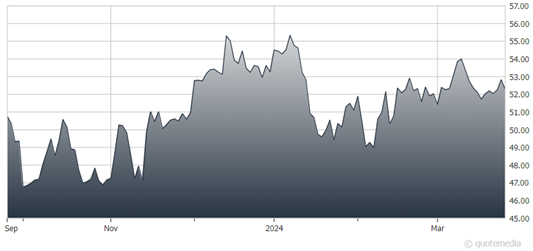Black Hills Corp. (BKH) is an electric utility that provides electricity and natural gas to customers in Colorado, Iowa, Kansas, Montana, Nebraska, South Dakota, and Wyoming. Black Hills was founded in 1941, and has a $3.6 billion market cap, while generating about $2.2 billion in annual revenue. The company is a Dividend King thanks to 54 years of consecutive dividend increases, explains Ben Reynolds, editor of Sure Retirement.
Black Hills posted fourth-quarter and full-year earnings on Feb. 7 and results were better than expected. Revenue for the quarter came to $590 million, which was off 25% year-over-year. The decline was in line with the company’s fuel and purchased power costs. Earnings came to $1.17 per share during Q4, which beat estimates by a nickel. That was also 6% higher than the year-ago period.
Earnings per share came to $3.91 for the full year in 2023, and management has guided for $3.80 to $4 for 2024. We set our estimate at the midpoint of $3.90. We note that earnings around $3.90 would mark the third consecutive year of little or no earnings growth.
Black Hills Corp. (BKH)
Demand for electricity and gas is not very cyclical, although it is dependent upon weather conditions to some degree. Thus, Black Hills should remain profitable under most circumstances. The company should be able to weather future recessions well.
Black Hills’ dividend payout ratio declined between 2010 and 2019, due to a modest dividend growth rate. Today, the company pays out roughly 67% of its net profits in the form of dividends.
Black Hills’ growth over the coming years depends on several factors. This includes rate reviews, which drive revenues and profits per kWh. Another factor is the expansion of the company’s existing assets via new utility infrastructure.
Black Hills regularly adds new projects to its growth investment backlog. We forecast 4% annual growth. Shares of Black Hills have a price-to-earnings ratio of 13.6, compared to our target multiple of 17, implying a 4.5% annual tailwind from multiple expansion over the next five years.
Black Hills is expected to produce annual total returns of 12.4% through 2029, stemming from a 4% earnings growth rate, the starting yield of 4.9%, and 4.5% from potential multiple expansion.
Recommended Action: Buy BKH.










